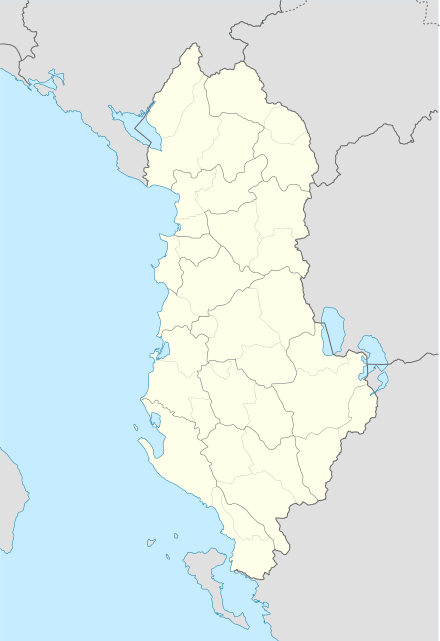Cepo
Cepo is a former municipality in the Gjirokastër County, southern Albania. At the 2015 local government reform it became a subdivision of the municipality Gjirokastër.[1] The population at the 2011 census was 1,727.[2] The municipal unit consists of the villages Fushëbardhë, Zhulat, Taroninë, Mashkullorë, Palokastër, Çepun, Kodër, Plesat, Kardhiq, Prongji and Humelicë.[3]
Cepo | |
|---|---|
 Cepo | |
| Coordinates: 40°7′N 20°5′E | |
| Country | |
| County | Gjirokastër |
| Municipality | Gjirokastër |
| Population (2011) | |
| • Municipal unit | 1,727 |
| Time zone | UTC+1 (CET) |
| • Summer (DST) | UTC+2 (CEST) |
| Vehicle registration | GJ |
In 1185 the seat of the Orthodox bishopric of Dryinopolis was moved to Cepo until 1395 when it was transferred to Argyrokastron (modern Gjirokastër).[4]
Historically speaking, Çepo had a mixed Muslim and Christian (Albanian Orthodox) population, with greater numbers of Muslims. Humelica was inhabited by a historically Christian population, Fushë Bardhe and Zhulat were inhabited by historically Muslim populations, and much of the rest of the commune is of mixed historical confession.[5] In the 2011 census, a plurality (44.72%) the population did not identify with one of Albania's four major denominations, while of the major four, Çepo had 42.79% Muslims, 9.44% Orthodox, 2.2% Bektashi, and 1.85% Catholic.[6] In Medieval times, Zhulat was the home of Papa Zhuli, a Catholic priest who is credited for the Kanun of Laberia.[7][8][9]
References
- "Law nr. 115/2014" (PDF). Archived from the original (PDF) on 2015-09-24. Retrieved 2015-06-10.
- "2011 census results" (PDF). Archived from the original (PDF) on 2016-03-04. Retrieved 2015-01-31.
- Greece – Albania Neighbourhood Programme Archived March 27, 2012, at the Wayback Machine
- Giakoumis, Georgios (2009). Δύο Πρώιμα Μετα-Βυζαντινά Μνημεία και ο Ζωγραφικός τους Διάκοσμος στο Πωγώνι [Two Early Post-Byzantine Monuments and their Internal Enivironment in Pogoni] (pdf) (in Greek). University of Ioannina. p. 19. Retrieved 16 December 2014. (PhD Thesis)
- Kallivretakis, Leonidas (1995). "Η ελληνική κοινότητα της Αλβανίας υπό το πρίσμα της ιστορικής γεωγραφίας και δημογραφίας [The Greek Community of Albania in terms of historical geography and demography." In Nikolakopoulos, Ilias, Kouloubis Theodoros A. & Thanos M. Veremis (eds). Ο Ελληνισμός της Αλβανίας [The Greeks of Albania]. University of Athens. p. 51.
- Robert Elsie (December 1, 2000). A Dictionary of Albanian Religion, Mythology, and Folk Culture. NYU Press. pp. 146, 149–150. ISBN 978-0814722145.
- R. Zojzi The Code of Labëria ("Kanuni i Labërisë" Tirana (Institute of Folk Culture Archives)
- I.Elezi (1994). E drejta zakonore e Labërisë ne planin krahasues. Shtëpia Botuese "Libri Universitar". OCLC 50645979.

